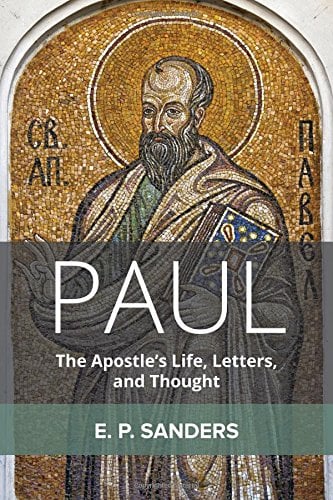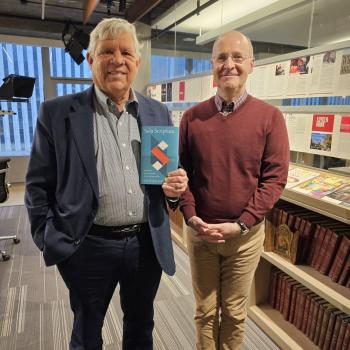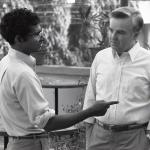pp. 400ff. A discussion of dualism.
p. 405— “divine punishment remained the only real ‘solution’ to evil and suffering that pure monotheism had to offer.” [This is absolutely false, but what is true is that Jews regularly attributed human suffering to the wages of sin, and sometimes to divine punishment as well. Sander’s statement doesn’t even comport with Josephus who affirms both free will and divine sovereignty].
p. 406–Sanders argues that this severe doctrine was ameliorated by the idea that things would be rectified in the world to come. Some Jews avoided attributing evil to God by accepting some form of dualism, but these other powers in the universe were seen as subordinate to God. They even thought of two powers in heaven one good, one bad (see A. Segal’s Two Powers book on this). Cosmic dualism was often worked out chronologically— this age is evil but God will defeat and supercede it with a good one.
p. 407— body/soul dualism does not necessarily affirm that the body is bad or evil, maybe just weak and inferior, but Sanders says it’s a slippery slope to affirm this. “First one proposes that the pleasures of the flesh should be enjoyed only moderately….Then one proposes the pleasures of the flesh should be avoided: sex is only for procreation not for pleasure. It is short step to the view that the physical body is evil.” This anti-flesh, anti-pleasure form of body/soul dualism, which partially penetrated Christianity. This issue has never been resolved in Christianity “Many, many Christians are monotheists who accept the existence of evil powers, such as Satan, though maintaining that finally God will conquer them.”
p. 408— Clearly, Paul believed in cosmic dualism— Christ has to conquer these powers among whom are Satan ( 2 Cor. 11.4 and 2 Cor. 4.4—where he is called ‘the god of this world’).
2 Cor. 3.18-5.10 “is among those [passages] that most forcefully raise the issue of the growth and development or movement of Paul’s thought. It includes elements of ongoing inner transformation, which we do not see in 1 Thess. or 1 Cor.” [N.B. this is an argument from silence. Just because it isn’t mentioned in those letters doesn’t mean Paul didn’t affirm such ideas. And he is wrong that Paul forcefully rejects body/soul dualism in 1 Cor 15. Had he done so his response to proxy baptism would have been very different.]
p. 409—2 Cor. 5.10 says Sanders assumes the evil powers have been destroyed or rendered inoperative.
p. 410—2 Cor. 3.18 refers to inner transformation. He compares 1 Cor. 15.49, 51-52 where transformed into his image involves the body, but here it doesn’t. The inner person is being renewed day by day, the outer person is wasting away.
p. 411—Paul adds that the inner self is eternal the outer self passes away. Sanders calls this Paul’s most Platonic moment (see Phaedo 80e the soul is immortal not the body— what is real can’t be destroyed, what can be destroyed is not real). He takes 2 Cor. 5.17 ‘the old has passed away, everything has become new’ to be a contradiction to Rom. 8.19-23 where the creation is still groaning and awaiting redemption. Image he says refers to something visible, but the change he is talking about is inner and invisible to the naked eye.
p. 412—he conjectures that Paul says what he says here in 2 Cor. 3 because he was himself feeling the delay of the Parousia [something Paul neither says anything about nor shows anxiety about it. You can’t have a delayed Parousia if you haven’t got a timetable in your head, and he didn’t].
p. 413—“it is striking that present transformation enters his letters in 2 Cor. and remains through the last letter, Romans, while discussion of the Parousia fades into fairly brief reminders”. [Nope.]
2 Cor. 4.16 shows he does not use the term soul for the inner person, but he does distinguish outer from inner. [This is not to be confused with old self/new self language].
p. 414—he minimizes 2 Cor. 5.8 to be absent from the body and present with the Lord. He argues that 2 Cor. 5.8 is governed by ‘longing to be clothed with our heavenly dwelling’.
p. 415— He sees two differences between 2 Cor. 3.18-5.10 and 1 Cor. 15— the former emphasizes transformation in the present, and the former speaks of an inner and outer self. The language of further clothed and swallowed shows he still affirms future res.
p. 416– Sanders rightly notes that in 2 Cor. Paul places himself with those who may die before the Lord returns. 2 Cor. 5.1— what happens if the tent in which we are living is destroyed? Cf. 5.8—and in 4.14 confidence in the res. which will involve Paul and his converts being brought into Christ’s presence. G. Tatum, New Chapters in the Life of Paul (CBA monograph, 2006) he places Gal. between 2 Cor. 10-13 and 2 Cor. 1-9. [This is one of the few places where Sanders actually mentions scholarship since the 1990s and NT scholarship since the 80s].
p. 419—Phil. 3.20-21 he says has language reminiscent of 1 Thess. 1.10 Christ returns from heaven, will transform the body echoes 1 Cor. 15.51-52. Subjection of all things echoes 1 Cor. 15.26-28. Body of humiliation transformed into glorious body as 1 Cor 15 says. Phil. 1.23 affirms the notion person departing from the body and going and being with Christ.
p. 420—Sanders is right that in Phil. 1.21-23 Paul is contemplating his possible death and this prompts dualistic thinking, but Paul had contemplated that before surely. In 3.10-21—he contemplates the future res.
p. 421- Sanders admits that Paul envisions the destruction of the non-believer in Phil. 3.18-19, and at Rom 9.22 he speaks vessels of wrath made for destruction and so Rom. 2.5-8. But Sanders thinks there are other passages like Rom. 11.32 where Paul envisions God saving everyone.
















